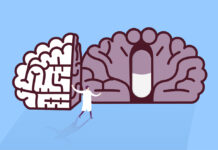Following an extensive systematic review of treatments for major depression, the American College of Physicians (ACP) issued a recommendation to clinicians suggesting cognitive behavioral therapy (CBT) as a first-line treatment for major depressive disorder along with second-generation antidepressants. The results of the review revealed that CBT and antidepressants have similar levels of effectiveness but that antidepressants present serious side-effects and higher relapse rates.

“Although [second generation antidepressants] SGAs are often initially prescribed for patients with depression, CBT is a reasonable approach for initial treatment and should be strongly considered as an alternative treatment to SGAs where available,” the researchers concluded.
The ACP reviewed randomized control trials from 1990 to 2015 for four different approaches to treating the symptoms related to major depressive disorder. The approaches include psychotherapy (CBT, interpersonal therapy, and psychodynamic therapy), alternative medicine (St. John’s wort, yoga, acupuncture, omega 3s, meditation), exercise, and pharmacotherapy (SGAs).
While the available evidence showed that SGAs had greater effectiveness than omega 3s and escitalopram (SAMe), there was no difference in response between SGAs and interpersonal therapy, psychodynamic therapy, acupuncture monotherapy, St. John’s Wort, yoga, exercise, or CBT.
Currently, “patients are often treated for depression by primary care physicians who frequently prescribe SGAs,” but in their review, the ACP found that antidepressants were no more effective than therapy or alternative treatments.
“For most comparisons studied, low-quality evidence showed no difference in effectiveness or adverse effects between first-line intervention using pharmacologic (SGAs) or nonpharmacologic (CAM or exercise monotherapies or combination therapies) treatments in patients with MDD.”
The ACP clinical practice guidelines reflect these findings.
More:
Medscape Medical News: Therapy, Antidepressants Similarly Effective for Depression
*
Qaseem A, Barry MJ, Kansagara D, for the Clinical Guidelines Committee of the American College of Physicians. Nonpharmacologic Versus Pharmacologic Treatment of Adult Patients With Major Depressive Disorder: A Clinical Practice Guideline From the American College of Physicians. Ann Intern Med. [Epub ahead of print 9 February 2016] doi:10.7326/M15-2570 (Full Text)















What length of psychotherapy is being compared to antidepressants? 2 weeks? 2 months? 10 sessions?
These comparisons are meaningless without the context.
Most likely the therapy offered is extremely short term. For most depressed people’s life problems, such a length of “therapy” is barely enough to scratch the surface of what is going on or to change deep-seated personality problems.
Report comment
Instead of saying, “CBT equal to antidepressants”, the title of the review could be “blah blah” and it would have about as much validity.
Report comment
Their problem is that they don’t realize they’re dealing with a syndrome likely to have multiple possible causes and therefore see no reason to tease out subsets that have specific treatments.
Report comment
Tepid recommendations when looking at the actual conclusions of the data! What it SHOULD say is “Antidepressants should only be used as second line treatment when acupuncture, yoga, exercise, St. John’s wort, and individual therapy have been attempted without success. Antidepressants have no more effect than any of the above, and yet have a much more serious side effect profile, so the risk/benefit analysis speaks strongly against antidepressants unless other less risky efforts have proven fruitless.”
And that’s not even getting into the question of why we’d expect “depression,” which could result from a wide range of causes, to always respond to one particular approach.
—- Steve
Report comment
So what are the criteria for Bipolar II Depression, which is unlike Major Depression? Sunshine and CBT? Have they ever considered that the Depression is SO severe that talking about it only makes you more Depressed?
CBT is helpful.
But only if you feel good enough to come up and talk.
Report comment